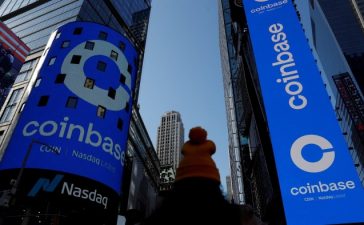Introduction: UK economy to ‘turn a page’ in 2024
Good morning, and welcome to our rolling coverage of business, the financial markets and the world economy.
With just two trading days until the new year, thoughts in the City of London are turning to 2024. How fast will interest rates be cut? Will the UK avoid recession? When will the general election be, and who will win?
Accountancy group PwC has stirred the pot with their own economic outlook for the coming year. And it predicts a more rosy view on the economy next year, as the UK “turns a page from the difficult post-pandemic years”.
PwC points to several reasons for optimism – conditions for households are expected to improve, as the minimum wage is increased by almost 10% in the spring.
Inflation is tipped to fall faster than expected, close to the UK’s 2% target, which will help consumer sentiment to turn a corner.
And while growth is likely to be weak, the UK is expected to post a faster recovery compared to pre-pandemic levels than Germany, France or Japan.
PwC predicts:
The UK will be the fourth best performing G7 economy relative to pre-pandemic levels: Despite weak projected growth in 2024, the UK will still outperform France, Japan and Germany with real GDP around 2.7% higher in 2024 on average relative to 2019 levels.
BUT there’s bad news too. Even if inflation does cool, consumer prices will still be about a quarter higher than in early 2021.
Average rents in London are forecast to keep climbing, and will average more than £2,000 per month by the end of 2024 – around three times higher than in the north-east on average.
The rest of the UK will also see a continued rise in rents with an average increase of over 5% in 2024.
And PwC expects “a significant rise in corporate insolvencies in 2024”, with almost 30,000 firms expected to fail under the pressure of high interest rates, and increased costs.
Many will be smaller businesses, in sector such as hotels & catering, manufacturing, and transport & storage.
Barret Kupelian, chief economist at PwC, says the UK’s economic outlook is ‘far rosier’ than it appeared a year ago, although geopolitical tensions could change the picture…
“Following the post-pandemic challenges, 2024 will be the year the UK turns a page. Inflation returning closer to normal levels, progress on regional growth and real incomes improving provides optimism for the year ahead, despite the legacy of higher consumer prices and rising housing costs.
There remain many ‘known unknowns’ in 2024 that can change the trajectory of the UK, such as volatility in global energy prices due to the continued middle eastern conflict and the forthcoming General Election, however, overall the outlook is far rosier for 2024 than expected twelve months ago.
The agenda
Key events
India’s stock market hits record high
Indian shares have hit a record high this morning, as Asia-Pacific markets continue to rally as traders bet on interest rate cuts from major central banks next year.
India’s blue-chip NSE Nifty 50 index has gained 0.3% to hit 21,721.10 points, while the S&P BSE Sensex is up 0.31% at 72,264.17 points.
India’s stock market has gained over 18% this year, helped by solid growth in corporate earnings so far and a positive outlook over the next three years, analysts say.
UK government debt has hit a near nine-month high this morning, as City traders anticipate the Bank of England will cut interest rates in 2024.
Britain’s benchmark 10-year gilt yield briefly fell to its lowest level since April 6 this morning, dipping to 3.433% at the start of trading, Reuters reports.
Yields measure the rate of return on a bond, and fall when prices rise.
FT: Global defence orders surge as geopolitical tensions mount
2023 has been another busy year for the world’s major weapons makers, as geopolitical tensions have grown.
The Financial Times has calculated that the order books of the world’s biggest defence companies are near record highs after growing by more than 10% in just two years, partly due to the conflict in Ukraine.
They explain:
An analysis by the Financial Times of 15 defence groups, including the largest US contractors, Britain’s BAE Systems and South Korea’s Hanwha Aerospace, found that at the end of 2022 — the latest for which full-year data is available — their combined order backlogs were $777.6bn, up from $701.2bn two years earlier.
The trend’s momentum continued into 2023. In the first six months of this year — the latest comprehensive quarterly data available — combined backlogs at these companies stood at $764bn, swelling their future pipeline of work as governments kept placing orders.
European stock markets have opened higher.
In London, the FTSE 100 index has gained 20 points, or 0.25%, to 7744 points.
Mining stocks are leading the risers, with Rio Tinto up 1.2% and Anglo American gaining 1% (the weaker dollar has lifted commodity prices).
Germany’s DAX has gained 0.2% with France’s CAC 0.3% higher.
Bloomberg; UK economy set to escape hard landing in boost for Rishi Sunak
A survey of economists by Bloomberg, released this morning, predicts Britain’s economy will probably avoid a recession in 2024.
The poll of 52 economists found that the economy is expected to strengthen in the second half of next year as consumers benefit from falling inflation and the easing of a lengthy cost-of-living crisis.
Although the economy is only forecast to expand by 0.3% in 2024, the Treasury and the Bank of England are now expected to engineer a soft landing for the economy next year.
That would be a boost for Rishi Sunak as he considers when the next general election should be called.
However, we learned just before Christmas that the economy shrank in July-September, putting it on the brink of recession. Another contraction in October-December would mean a technical recession.
Bloomberg say:
Almost a third of the economists who submitted quarterly forecasts to the Bloomberg survey expect a contraction in the final three months of 2023. That would put the UK in recession under the common definition of two consecutive quarters of negative growth.
Pound jumps over $1.28
The pound has hit its highest level against the US dollar since the beginning of August, as investors continue to bet on falling US interest rates in 2024.
Sterling has climbed to $1.2825, its highest level in almost five months, as the dollar weakens in somewhat thin trading this morning.

Traders are anticipating that the US central bank, the Federal Reserve, will cut interest rates briskly in 2024, as inflation in America continues to cool.
Soft US economic data is helping to weaken the dollar.
Ipek Ozkardeskaya, senior analyst at Swissquote Bank, explains:
Released yesterday, the Richmond Manufacturing index came in much softer than expected – hinting at a significantly faster slowdown in economic activity in December, shipments also contracted significantly compared to a year ago.
US interest rates are currently a range of 5.25%-5.5%; and could fall to 3.5%-3.75% by December 2024, according to CME Fedwatch.
UK interest rates are also expected to fall next year, though, from 5.25% today to as low as 3.75% by next December, according to the latest money market pricing.
Introduction: UK economy to ‘turn a page’ in 2024
Good morning, and welcome to our rolling coverage of business, the financial markets and the world economy.
With just two trading days until the new year, thoughts in the City of London are turning to 2024. How fast will interest rates be cut? Will the UK avoid recession? When will the general election be, and who will win?
Accountancy group PwC has stirred the pot with their own economic outlook for the coming year. And it predicts a more rosy view on the economy next year, as the UK “turns a page from the difficult post-pandemic years”.
PwC points to several reasons for optimism – conditions for households are expected to improve, as the minimum wage is increased by almost 10% in the spring.
Inflation is tipped to fall faster than expected, close to the UK’s 2% target, which will help consumer sentiment to turn a corner.
And while growth is likely to be weak, the UK is expected to post a faster recovery compared to pre-pandemic levels than Germany, France or Japan.
PwC predicts:
The UK will be the fourth best performing G7 economy relative to pre-pandemic levels: Despite weak projected growth in 2024, the UK will still outperform France, Japan and Germany with real GDP around 2.7% higher in 2024 on average relative to 2019 levels.
BUT there’s bad news too. Even if inflation does cool, consumer prices will still be about a quarter higher than in early 2021.
Average rents in London are forecast to keep climbing, and will average more than £2,000 per month by the end of 2024 – around three times higher than in the north-east on average.
The rest of the UK will also see a continued rise in rents with an average increase of over 5% in 2024.
And PwC expects “a significant rise in corporate insolvencies in 2024”, with almost 30,000 firms expected to fail under the pressure of high interest rates, and increased costs.
Many will be smaller businesses, in sector such as hotels & catering, manufacturing, and transport & storage.
Barret Kupelian, chief economist at PwC, says the UK’s economic outlook is ‘far rosier’ than it appeared a year ago, although geopolitical tensions could change the picture…
“Following the post-pandemic challenges, 2024 will be the year the UK turns a page. Inflation returning closer to normal levels, progress on regional growth and real incomes improving provides optimism for the year ahead, despite the legacy of higher consumer prices and rising housing costs.
There remain many ‘known unknowns’ in 2024 that can change the trajectory of the UK, such as volatility in global energy prices due to the continued middle eastern conflict and the forthcoming General Election, however, overall the outlook is far rosier for 2024 than expected twelve months ago.







